
Last night I decided to cool my Netfliction and head out to see a movie, which is a more economical proposition in Chicago than in most parts of the New York area (though New York always gets new films before the Third City).
Having already seen
The Constant Gardener, which I recommend--though if current events are stressing you out you may want to brace yourself for lots of topicality, as well as several
National Geographic exotica moments--I debated whether to see
Garçon Stupide (Stupid Boy) Swiss director
Lionel Baier's first feature-length film, or
El crimen ferpecto (Ferpect Crime), Álex de Iglesia's well praised dark comedy. The former film's gay storyline, frank sexual content, and experimental formal conceits were tipping the scale. Then on my way to the cinema, I ran into two female friends who had just seen the film and at first were split, but they both ended up saying that it was worth seeing, so my decision was firm.
Garçon Stupide is, I realize after thinking about it a bit more, a very provocative, fresh and worthwhile film. Initially I wasn't so sure. It does tends towards moralism in its overall message, is unnecessarily art(s)y at times, and isn't fully plausible in terms of the trajectory of its narrative and plot, but its complexity, in terms of the filmmaking and the narrative itself, elevates it among the films that I've seen of late. Up to its final moments, it presents a well-drawn drama without melodrama, and avoids sentimentality in depicting a story that almost no American filmmaker I can think of, and few American producers, would put on the screen.
Garçon Stupide centers on the story of a 20-year-old, undereducated, confused chocolate factory worker named
Loïc, who lives in the provincial, French-speaking Swiss city of Bulle, not far from the larger metropolis of Lausanne, where he lodges on weekends with his female friend,
Marie, who's a student working in a natural history museum. Though we see that Marie harbors romantic feelings towards Loïc, he spends much of his free time trolling for sex with men he meets on the Internet and street, survives on aspirin and Maalox, and snaps photos with his mobile phone camera. A child trapped in a man's body, with a man's libido, he lives for the sensory pleasures of casual sex, it appears, and little else. While Marie accepts Loïc's (homo)sexuality, she doesn't really want to know the details, which the self-absorbed Loïc insists on rubbing in her face. Eventually, Loïc meets an older man online, named
Lionel, who's played by the film's director. We never see Lionel's face. He apparently carries a movie camera with him at all times and we hear his voice in the filmed exchanges with the young man. Unlike most of the men Loïc meets, he doesn't want the 20-year-old for sex, but is interested in conversation and non-sexual intimacy, which he describes to Loïc in philosophical terms. He even praises Loïc's photographic talent, which Marie also encourages, though the young man doubt's Lionel's motives and his female friend's advice. In fact, while Loïc is obviously drawn to Marie because of platonic aspect of their relationship, Lionel's lack of sexual interest unnerves him, since who seems to relate to every other gay man he meets in purely carnal terms, even going so far as to state that he doesn't like small talk, but just wants to get to the action. Loïc, after try to force Lionel's hand, eventually breaks off relations with him.

Meanwhile, Marie has found another male friend who takes a seemingly romantic interest in her, which upsets the confused Loïc; although he has told Lionel that he's unreservedly gay and not bi, he assumes the macho jealous role, menaces Marie's male friend, and then insults her so badly that she gets fed up. Having tired of his puerility and of serving as a quasi-parent to (rather than having an more equal relationship with) him, she throws him out, severing relations between them. His childish response is to ignore her and Lionel's calls, with tragic results. Now on his own, he has to decide what he wants to do with his life, beyond his dead-end job, the nonstop fucking, and his growing obsession with a handsome, Afro-Portuguese soccer player named
Rui Pedro Alves (pictured at right, Ugo Robard on the left, Alves on the right), whom he basically stalks for a while. After a final meeting with Lionel, during which he announces that he is no longer gay, he decides to drop in on Marie, but finds that she has committed suicide (with a deft touch, Baier sets up early on in the film which means by which she does so), so Loïc steals her car, goes driving up into the Alps and...in a dreamlike sequence, meets Rui Alves and his infant son Noah, spending time with them in the dazzling snow. On his way back, he has crashes Marie's car and has to live again briefly with his non-responsive parents as he convalesces, which leads to an epiphany: he must, as Rilke says, "change his life." He does, and in a final scene, realizes that real love might be possible.
Pierre Chatagny turns in an excellent performance as the alienated, searching, debauched young Loïc. He makes palpable the young man's churning combination of confidence (in his sexual prowess and dominance, attractiveness, and narcissistic esprit de vivre), ignorance (he has never heard of Hitler (!), and has to look up "Impressionism" after spotting it on the spine of a book in the apartment of one of his tricks, he has never seen frenum piercings and thinks they are totally novel, etc.), and naïeveté, or in other words, his rich and complex subjectivity. In this role Chatagny embodies a nexus of cool self-possession and roiling self-confusion so strong that it borders on social pathology, and Marie's character eventually calls him on it. Natacha Koutchoumov turns in an equally fine performance as Marie, whose obvious love for Loïc battles with her frustration at his inability to respect or love her back, or get his life in order. Often she is able to convey the tension through facial expressions and posture alone, and expressions in the scene in which she is reading one of her course books as he amusedly watches a sausage-making show, utterly oblivious to her presence, show more than a minute of dialogue. The Lionel conceit, however, which melds cinema verité documentary with the fictionalized realist space of the rest of the film, doesn't really work, in my opinion. (The mixing of verisimilitudinous realism, through the use of the documentary device and non-actors like the real football player Alves, is quite fascinating.) Lionel, as Baier portrays him, is not an interesting character, and feels almost vampirous. As interesting as Baier's innovative gesture is in principle, by the end of the film I felt the unseen Lionel character could have been utilized much more carefully and artistically, especially in making Loïc's epiphany and life change plausible. As it is, when he disappears, I didn't really miss him, yet because the self-referentiality of the Baier-Lionel character had unsettled the film's fictive space, calling undue attention to the other moments of artifice in the movie and blunting the power of the dream-like sequences that come later on. (On the other hand, Lionel's physical absence, in theoretical terms, foregrounds a certain type of gay male gaze and its directional vector; the older man is socially and sexually invisible yet intellectually present, while the younger, attractive sexual dynamo, a kind of cipher, is the focus.)
As I noted above, Baier includes several scenes of explicit male-male sex, as well as post-sex action, from Loïc doffing a used condom and cleansing his foreskin to the man he has sex with wiping his ass. This worked well in terms of the film's documentary feel, but then Baier wants to have it both--or multiple ways--by overtly invoking visual symbols during the sex scenes as if to underline a moralistic view of Loïc's actions. He does so by employing split screens during the sex--as well as at other times--with one screen showing the fucking (which includes an orgy) while the other one shows stuffed animals in the natural history museum or the machines at Loïc's factory. The film at times aims for comedy, and some of these parallels are comical, though I wasn't sure whether Baier intended them to be so; at any rate, the director is hammering into our heads the fact that the young man's sexual experiences, which are depicted as ntense and pleasure-filled, are empty, mechanical, dead. Again, I liked attempt at an innovative gesture, but I think it's too much. Moreover, it sets up a Platonic schema--and here I am thinking of the Plato of the
Symposium--that can only be read as moral. We do not see Marie's satisfying sexual encounter, only its tender aftermath, which Loïc creepily threatens, literally, at knifepoint, and Lionel, who does not want Loïc physically, but emotionally and psychologically, remains disembodied, except as a voice of reason. That is, true love exists beyond the realm of the flesh, spiritually, especially the expressedly genital.
Baier underscores this split, I think, in the Alpine scenes involving Loïc and Alves: we do see the soccer player (even briefly in the nude), but the beginning of their true moment of connection occurs on the blindlingly white slopes, with the bodies dematerializing into the blankness, symbolic of a space almost beyond the earthly realm, and when they do fully connect at an emotional level, with the truth-telling Black man serving as Loïc's means of catharsis, it is platonic as well--there is nothing sexual between them--and Alves's snowblindness renders his body ineffective. They can only communicate spiritually. Their exchange, in which Loïc finally must show some tenderness and care for another person, jumpstarts the younger man's process of profound realization. After his recuperation, he has decided what he will do with his life and enunciates his personal manifesto--he will no longer be a "garçon stupide"--and will tell his own story. No more mindless screwing, no more emptiness, no more playing at being a photographer, no more trying to escape his true identity, which is beyond categories, or so he declares. Only then does he meet the man, a bleached blond twink, for whom we're led to believe he can feel true love. The final scene, on a brightly lit ferris wheel, with lush music by Rachmaninoff, hovers between dream and reality, and concludes on a romantic, almost schmalzily sentimental note. Loïc is looking upwards, downwards, literally reaching towards the beloved, but the physical connection, which we get so graphically earlier on, doesn't occur.

While I found the romantic ending endearing, I also felt it was predictable and it left me unsatisfied. I wanted to believe that Loïc's change was organic, but I didn't buy it. I also found the Platonic schema troubling, and an unfair indictment of casual sex and promiscuity. What if Baier had not problematized Loïc's sex life in this moralistic way, or counterbalanced it with Marie's (pictured at left) as he does? In a review of the film, Jeannette Catsoulis of the
New York Times described Loïc's life as "dangerous"; but why? What was dangerous--the sex or the facts that he was emotionally volatile, stuck in a deadening job and living in a dysfunctional relationship? I would venture that Catsoulis, following Baier's lead, felt that the problem lay in the sex. (In fact, Baier shows us that he practiced safe sex.) In a way, the gay sex seemed to be there not only to make the film's point, but for shock value. I'm thinking primarily of the orgy scene, following Loïc's outburst at Lionel and his visit to a dance club; it was if the multiple partnering was a final, Dionysian burst before he turned to the more Apollonian aspects of his personality. But what if Baier explored the utopian aspects of the sex? The fact that although Loïc cannot afford McDonalds (this forms a little joke in the film), his looks and body are a source of power, a commodity of ready exchange value, functioning as a counterweight his lack of education and his alienated labor in the factory? The elements for a deeper view are there already. I also wondered about the trajectory towards the romantic ending and self-acceptance, a kind of bourgeois respectability that Baier questions through Marie's failed relationship and the deadened life of Loïc's parents. What if Baier had found more convincing means, without the film's central female character sacrificing herself (her body) and the lone non-White person sacrificing (even temporarily) his own (his eyes), to bring truth to Loïc? Or, after his friend's suicide and the mystical encounter with Rui Alves, which was a fascinating element in the film, he had not changed, or, had changed less dramatically, and hewed more to the ironic realism the documentary aspect of the film seemed to be asserting? In fact, I find I'm especially intrigued by the melding of the fictional and realistic storylines and wondering what else Baier might have done with them, especially his own character, "Lionel."
Overall, as I noted, the film is very interesting and worth seeing. It provokes quite a bit of thought, or at least did so for me. It made me wonder yet again about the differences between American and European cinematic portrayals of LGBT life. I'm not saying that European filmmakers don't fall prey to clichés or stereotypes at times, but in addition to the male frontal nudity, they often are willing to present much more complex portraits than one gets in most mainstream American gay films. I can think of at least ten European gay films--from France, Spain, Italy, the UK, Germany, and now Switzerland--that explore gender, class, racial and ethnic, and political/ideological complexities with far greater depth than most American LGBT films, which seem fixated on a fairly narrow, youthful, middle-class to upper-middle-class, usually White and male perspective, or, if class enters the picture, it revolves around hustling or prison scenarios. Perhaps the very fact of my mentioning "mainstream" is the determinative factor in what American filmmakers put on screen, even American LGBT filmmakers.
All of which leads me to add that I wish I could see more commercial, feature films--not just tiny little films or shorts or documentaries that play at the New Fest or Mix and then are hard to get ahold of--that address LGBT life, especially the lives of LGBT people of color, women, older people, fat people, people with disabilities, sexual minorities, etc.--with similar candor, innovation and risk. I know the screenwriters and directors are out there--out here. Please, if you can, can you get some (more) of these films on screen?
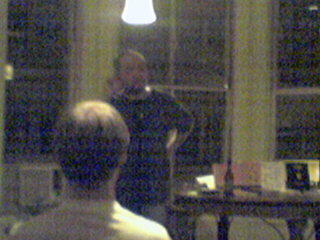

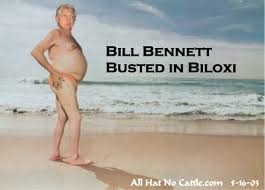


 Yesterday I touted Oprah Winfrey's return to championing books by living authors (of fiction and some types of non-fiction), so it's especially appropriate that I post that yesterday also marked the start of the
Yesterday I touted Oprah Winfrey's return to championing books by living authors (of fiction and some types of non-fiction), so it's especially appropriate that I post that yesterday also marked the start of the  More than once I've joked about Oprah Winfrey possessing some special mental ray or signal that, when she beams it out from during the taping of her show on her Harpo Studio soundstage, brainwashes millions of people, particularly suburban, middle-and-upper-middle class women, who are immediately reduced to ecstatic Oprahettes. Of course the truth is that Winfrey is a brilliant businessperson and savvy performer who has steadily refined her methods for connecting with her audience, which she has expanded over the years to transform herself into one of the highest-earning and most influential TV entertainers of all time, as well as one of the richest Black people on earth. Several years ago, she also became one of the most powerful and influential people in publishing through her Oprah's Book Club, which from
More than once I've joked about Oprah Winfrey possessing some special mental ray or signal that, when she beams it out from during the taping of her show on her Harpo Studio soundstage, brainwashes millions of people, particularly suburban, middle-and-upper-middle class women, who are immediately reduced to ecstatic Oprahettes. Of course the truth is that Winfrey is a brilliant businessperson and savvy performer who has steadily refined her methods for connecting with her audience, which she has expanded over the years to transform herself into one of the highest-earning and most influential TV entertainers of all time, as well as one of the richest Black people on earth. Several years ago, she also became one of the most powerful and influential people in publishing through her Oprah's Book Club, which from 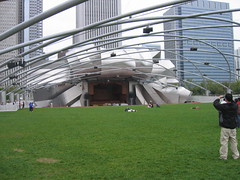







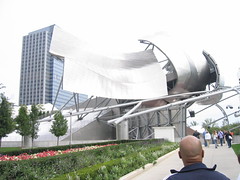

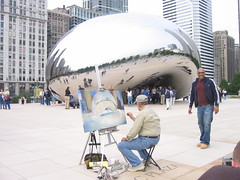

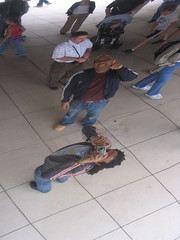
 Here's a poem by one of my favorite poets, the late Mexican, gay playwright and poet Xavier Villaurrutia (1903-1950), whose work I tried to teach myself to translate from Spanish before I could really read the language because his lyrical gifts seemed so powerful from the little I was able to divine.
Here's a poem by one of my favorite poets, the late Mexican, gay playwright and poet Xavier Villaurrutia (1903-1950), whose work I tried to teach myself to translate from Spanish before I could really read the language because his lyrical gifts seemed so powerful from the little I was able to divine.


 Today was the first day of classes, which went well, though I never get enough sleep the night before and so am always exhausted by day's end. The new classes make me think of former students, to whom I extend fond greetings and for those who graduated earlier this summer, my heartiest congratulations. I really do miss you! There are probably fifty writers I enjoy reading more than Stuart Dybek--well, maybe forty--but I never tire of his reading or using for my intro fiction class his story "Pet Milk," which is quintessential Dybek, especially in its retrospective trajectory and lyrical ending, and which, in its first few paragraphs, provides any number of examples of how a very good contemporary American short story works. The polysemous verb "snow" in the first sentence, like the language embodying the gurgling of the condensed milk a little later in the opening paragraph, are such perfect examples of masterful writing I they should be included in most standard fiction-writing guides. In the ones I've looked through, they aren't....
Today was the first day of classes, which went well, though I never get enough sleep the night before and so am always exhausted by day's end. The new classes make me think of former students, to whom I extend fond greetings and for those who graduated earlier this summer, my heartiest congratulations. I really do miss you! There are probably fifty writers I enjoy reading more than Stuart Dybek--well, maybe forty--but I never tire of his reading or using for my intro fiction class his story "Pet Milk," which is quintessential Dybek, especially in its retrospective trajectory and lyrical ending, and which, in its first few paragraphs, provides any number of examples of how a very good contemporary American short story works. The polysemous verb "snow" in the first sentence, like the language embodying the gurgling of the condensed milk a little later in the opening paragraph, are such perfect examples of masterful writing I they should be included in most standard fiction-writing guides. In the ones I've looked through, they aren't.... An old friend was in town from Boston, so we had dinner at an excellent Italian restaurant called Topo Gigio, in Old Town. If you're in Chicago near the Loop and are looking for a delicious and reasonable place to eat, this is definitely a place to hit. It's on Wells, just south of North Avenue, and parking is available around the block. As I drove her back to her hotel, we passed
An old friend was in town from Boston, so we had dinner at an excellent Italian restaurant called Topo Gigio, in Old Town. If you're in Chicago near the Loop and are looking for a delicious and reasonable place to eat, this is definitely a place to hit. It's on Wells, just south of North Avenue, and parking is available around the block. As I drove her back to her hotel, we passed 



 Last night I decided to cool my Netfliction and head out to see a movie, which is a more economical proposition in Chicago than in most parts of the New York area (though New York always gets new films before the Third City).
Last night I decided to cool my Netfliction and head out to see a movie, which is a more economical proposition in Chicago than in most parts of the New York area (though New York always gets new films before the Third City).
















